November 28, 2024 | 02:45 GMT +7
November 28, 2024 | 02:45 GMT +7
Hotline: 0913.378.918
November 28, 2024 | 02:45 GMT +7
Hotline: 0913.378.918
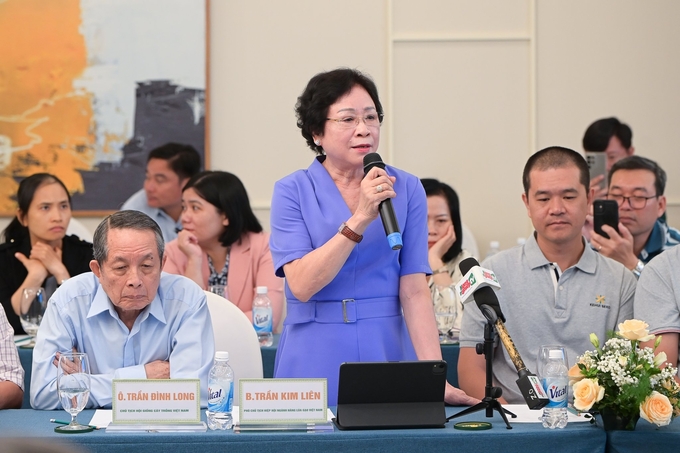
Tran Kim Lien, Chairwoman of the Board at Vinaseed, providing insights into the current legal challenges of collaboration in rice variety research and commercialization. Photo: Tung Dinh.
The Vietnam Food Association, in collaboration with the Vietnam Seed Trade Association and Vietnam Agriculture Newspaper, recently organized a seminar titled "Public-Private Partnership in Rice Variety Research and Commercialization." During the event, Tran Kim Lien, Chairwoman of the Board at Vietnam National Seed Group Joint Stock Company (Vinaseed), provided insights into the current challenges of collaboration in rice variety research and commercialization.
According to Chairwoman Lien, Vinaseed is a pionnering business within the field of crop varieties in Vietnam, maintaining collaborations with nearly all public research institutes for research and technology transfer in food crop varieties.
"There are various issues that we must discuss at today's forum; accordingly, we can reflect on the current state of policies, regulations, and address businesses' needs.
The seminar will provide a foundation for government management agencies and associations to coordinate in utilizing social resources. Businesses, as a key component of the market, must act as a bridge to connect researchers and the market. Without their assistance, scientists and research institutions will face considerable challenges in transforming scientific advancements into a reality," Chairwoman Lien emphasized.
Notably, the OM18 and OM5451 rice varieties, developed by the Cuu Long Delta Rice Research Institute, currently hold a significant market share. This achievement can be attributed to the Institute's efforts to collaborate and transfer its technology to Loc Troi Group. These two rice varieties currently cover approximately 40% of the company's total production area. Similarly, Vinaseed Dai Thom 8 rice variety has accounted for 30% of Vietnam's total rice exports for several years.
Total rice production area in the Mekong Delta in 2023: 3.724 million hectares.
Three rice varieties with the largest production areas in the Mekong Delta include:
- OM18: 881,525 hectares
- OM5451: 645,091 hectares
- Dai Thom 8: 638,894 hectares
Total production area for three varieties: 2.166 million hectares, accounting for over 58% of the total rice production area in the Mekong Delta.
(Source: Department of Crop Production)
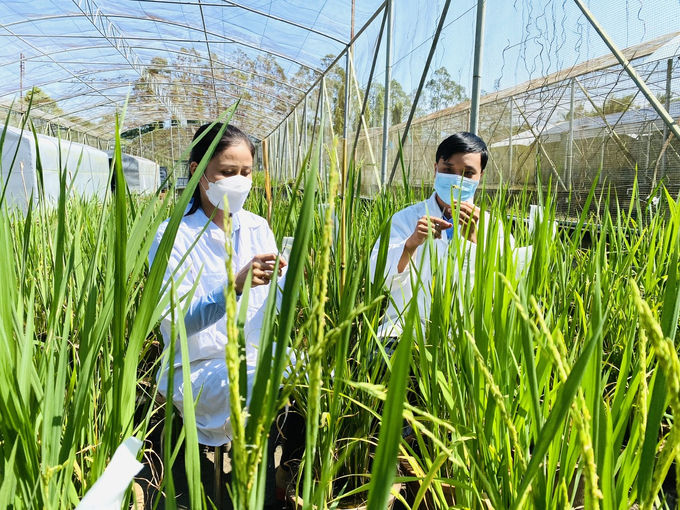
Rice variety research at the Mekong Delta Rice Research Institute. Photo: Le Hoang Vu.
Chairwoman Lien credited this success to the high quality of these rice varieties, as well as the collaboration between scientists, research institutions, and businesses. This public-private partnership aims to mobilize social resources, thereby creating a connection between public research institutions, businesses and market demands.
According to Tran Kim Lien, Vinaseed's recent accomplishments include acquiring eight rice varieties through outright purchase; transferring and assigning the rights to three rice varieties; and collaborating with scientists to transfer promising rice lines.
Additionally, Vinaseed has participated in multiple public-private partnerships, supported science and technology projects, and funded projects before the Law on Crop Production was enacted.
The company is currently collaborating on various projects; providing funding for Distinctness, Uniformity and Stability (DUS) Testing and Value for Cultivation, Use, and Sustainability (VCUS) Testing; and supporting the costs for variety recognition to secure priority rights in business cooperation.
"However, we had high hopes for the amendments to the Law on Intellectual Property and the Law on Management and Use of Public Assets; so far, these hopes have remained just that. In practice, we still have to comply with Decree No. 70/2018/ND-CP, which regulates the management and use of assets formed through the implementation of science and technology tasks using state funds.
Even Circular No. 02/2020 issued by the Ministry of Science and Technology, which guides the implementation of Article 41 under Decree No. 70, clearly stated that all stakeholders must comply with the regulations on public asset management," Chairwoman Lien added.
Regarding public assets, although businesses contribute between 30 and 40% of the funding for the research process, they do not possess the rights to ownership. While future amendments to Decree No. 70 remain a possibility, current regulations stand as significant challenges for businesses.
Chairwoman Lien also highlighted several significant challenges faced by businesses during the practical process of collaboration and technology transfer. Firstly, despite Vinaseed and various research institutes demonstrating their initiative in collaboration activities, all agreements are heavily dependent on civil law regulations, and mutual consent between involved parties.
This limitation signifies the absence of a unified legal framework established by competent authorities. According to Article 52 of the Law on Technology Transfer, the Ministry of Agriculture and Rural Development (MARD) is responsible for issuing a list of varieties, products, and technological processes, as well as the protocols for the transfer and recognition of research results from state-funded projects in agriculture.
Consequently, the lack of a legal framework presents a significant obstacle for conducting civil transactions with research institutes, and ensuring compliance with legal regulations for both businesses and institutes.
Regarding the issue of technology transfer, research institutes have faced considerable challenges following the enactment of Decree No. 70 in 2018. Furthermore, this Decree was accompanied by Circular No. 63 issued by the Ministry of Finance, which provided financial guidelines for Decree No. 70; and Circular No. 02/2020 issued by the Ministry of Science and Technology, which guided the implementation of Clause 1, Article 41 under Decree No. 70.
"Outright purchase and capital investment in research projects to gain ownership of rice varieties were only possible before 2018. Since then, research institutes have been reluctant to transfer ownership to businesses, even those who have contributed capital to research projects," explained Chairwoman Lien.
The underlying cause of this challenge is Decree No. 70, which requires all public assets to be valued based on their residual or market value, alongside profit and other intricate valuation criteria.
Consequently, the transfer of business rights between parties has remained as the only viable form of transaction after 2018. Despite multiple available options, all crop variety products from research institutes can be only transferred with production and business rights, subject to fees.
According to the Chairwoman, the risk lies in the absence of a legal framework to guide research institutes on the technology transfer process. Moreover, there is a lack of detailed on public pricing and auctions.
Regarding informal contracts and agreements, conventional market valuations can be contested during financial audits, which can lead to contract cancellations. This result poses a significant risk to both businesses and research institutes.
Despite ongoing financial contributions to state budgets, investment funds, and tax payments by research institutes, the absence of a detailed guidance leaves room for error.
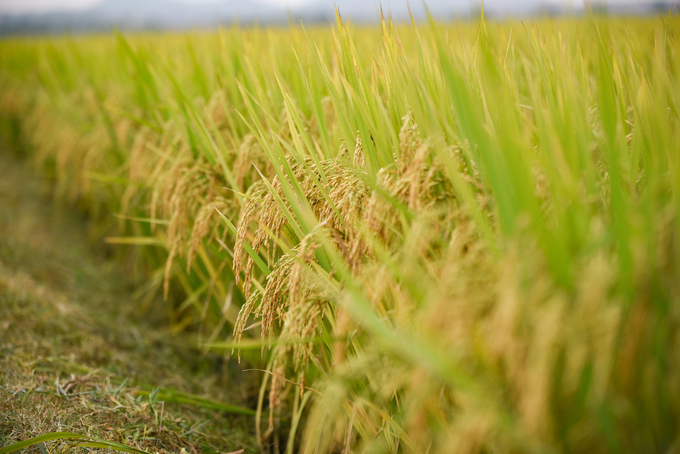
Businesses help translate scientific research achievements into practical applications. Photo: Tung Dinh.
Secondly, current civil agreements are made between the owner and the buyer; however, state management agencies lack legal frameworks to regulate said agreements. As a result, businesses may be subject to examination regarding the basis of pricing; if the agreed-upon price is rejected, the contract becomes null and void.
In other words, these transactions are civil agreements between two legal entities in full compliance with legal regulations. However, state regulations, specifically with the Ministry of Agriculture and Rural Development as the primary owner, dictate this transaction as illegitimate.
Regarding the issue of exclusivity, capital contribution for ownership is no longer feasible under current regulations. The transfer of business rights is currently the only viable option. Consequently, if businesses fail to acquire exclusive transfer rights, they are forced to withdraw from public-private partnerships.
From a business perspective, the lack of exclusivity raises concerns and risks. Namely, public availability may result in the loss of accountability.
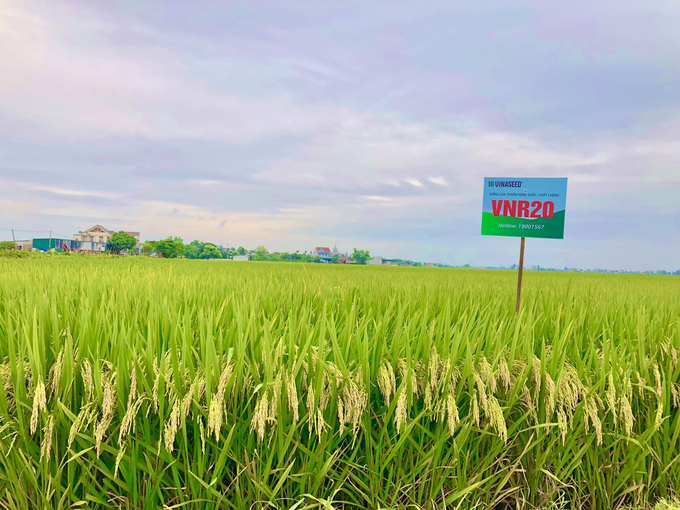
The VNR20 rice variety developed by Vinaseed.
Additionally, the prevalent mentality of purchasing only after a product is available poses significant challenges to the mobilization of social resources for research efforts. Consequently, Chairwoman Lien suggested the Ministry of Agriculture and Rural Development, the Department of Crop Production, the Department of Science, Technology and Environment, and research institutes nationwide to develop flexible solutions and mechanisms.
On the other hand, businesses face considerable difficulties in renewing seed licenses with contracts finalized before 2018. Research institutes are hesitant to sign renewals due to the cessation of the aforementioned transactions post-2018.
Without caution, there is a risk of losing valuable seed varieties. Notably, the DS1 rice variety in the northern region can potentially be lost without the possibility of being re-recognized. Similarly, the J01 variety in the southern region, acquired through outright purchase in 2016, also faces the risk of being lost without the possibility of being re-recognized. Despite Vinaseed’s willingness to relinquish exclusivity, renewals are not granted.
As a result, the business community has requested the Ministry of Agriculture and Rural Development to incentivize research institutes to renew licenses for rice varieties sold before the issuance of Decree No. 70. This initiative will enable the continued production and preservation of beneficial products for the agricultural sector.
Firstly, state management agencies should promptly issue a list of varieties, products, technology processes, and procedures for technology transfer and recognition.
With this list, businesses will have a detailed guideline on the procedures for cooperation, and the transfer and commercialization of superior varieties in the near future.
Additionally, stakeholders must emphasize transparency in technology transfer. With transparent mechanisms, all qualified enterprises willing to participate in public-private partnerships can assist scientists to develop commercial ventures.
Secondly, businesses have proposed state management agencies to promptly provide guidelines on public-private partnerships in order to facilitate the mobilization of social resources. Notably, the business community has expressed a keen interest to participate in this process.
Consequently, it is necessary to quickly establish a mechanism for collaboration between scientists, research institutes with both human resources and research facilities, and businesses, to utilize their potentials without being constrained by the Law on State Budget.
Translated by Nguyen Hai Long
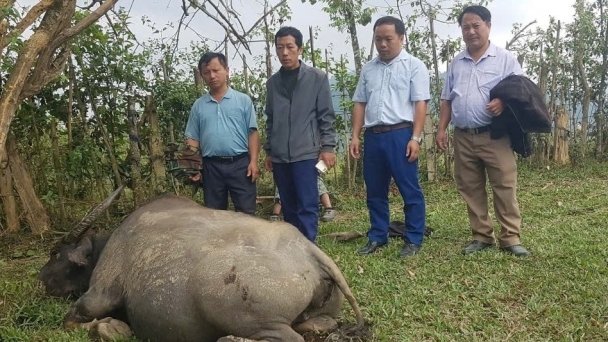
(VAN) Households in Huoi Mu village of Huoi Tu commune (Ky Son, Nghe An) are in a panic after buffaloes and cows suddenly die en masse.
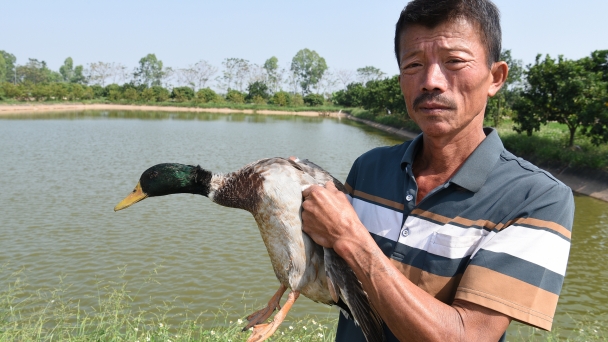
(VAN) The couple always raises 5,000 - 7,000 ducks, selling several hundred every day, not only throughout Hanoi but also the Central region.
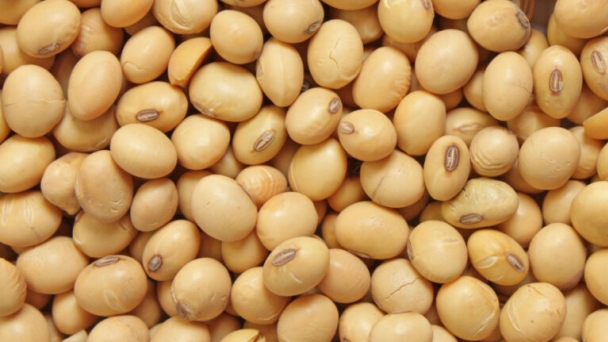
(VAN) Overcoming substantial resistance from environmental protection organisations, the Pakistani government has withdrawn a ban on GMO (genetically modified organism) soybean imports. The landmark decision is expected to aid the poultry sector.
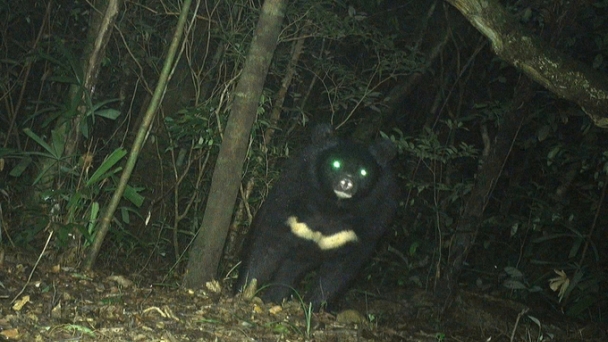
(VAN) An adult Asian black bear, weighing about 150kg, was discovered by camera traps at Bac Huong Hoa Nature Reserve, Quang Tri Province.
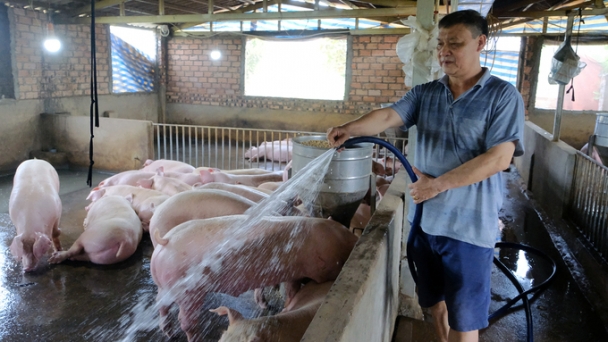
(VAN) Despite having commercial vaccine for African Swine Fever (ASF), experts agree that a comprehensive regional program is needed to address this issue.
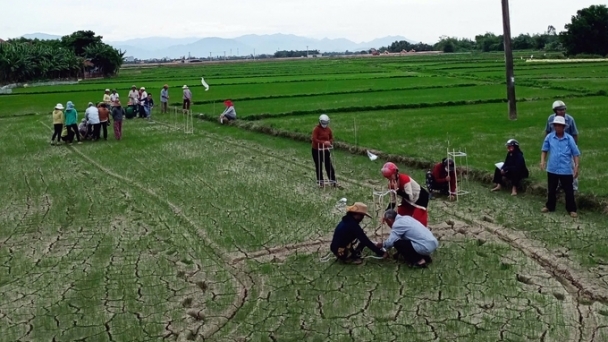
(VAN) Not only does applying Integrated Pest and Health Management (IPHM) reduce input material costs, but it also helps farmers increase both the yield and quality of rice crops.
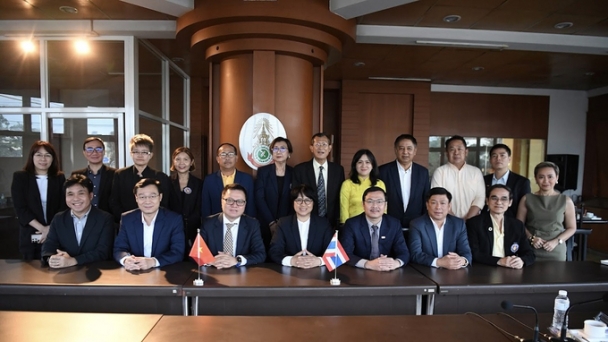
(VAN) The Thai side mentioned that next year, they are ready to host Vietnamese journalists for Thai language training and hope that Vietnam will also invite Thai reporters to Hanoi for Vietnamese language training.